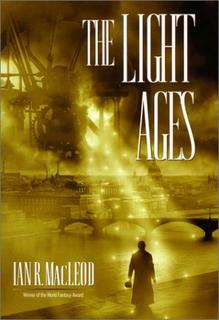
Now, where do I even begin? I bought this book out of sheer wanting something extra to bring to KYUEM, and so I picked this randomly out of the fantasy shelf. And when I saw the statement '...rival Phillip Pullman's Dark Materials Saga...', I immediately decided to give this one a go. Well, not THAT immediately, there was another book I was going to buy, forgot the title, but I flipped a coin, and this thing one, and so I ended taking this one home, a decision that I would later regeret. Now, I'm not one for slamming books really. I rarely pick up a book that I absolutely do not want to read, and hey, I did FINISH this book, but I must point out that I did so at an absolutley sluggish pace (2 weeks, which, for me, is a LONG period when it comes to books. My friends can testify to that) And, boy was I glad that I finished it! Now I can toss it aside and start worrying about the rest of the books on my reading list.
Basically this story revolves around a fantasy version of London, darker, smokier, foggier, and run on a substance called aether, the fundamental base of 'magic'. Aether basically dictates life, the guilds control the aether, and those without guilds are forced to live in poverty. This story is basically of the transition from the 'Dark Ages', ruled by aether, to a 'Light Age', where things change for the better. The story is told through the eyes of one Robert Burrows, who plays a part in the change. The story basically involves a large amount of power play and politics, discussions and social classes. Simply said, some could relate it to David Copperfield or any other story written by Charles Dickens, albeit the fantasy settings. The world has its fair of issues to deal with, poverty being only one of them. There are also changelings, people who have been exposed to too much aether to the point that they are transformed into trolls, or other deformed monstrosities. Before you get any ideas of them being a problem in the 'mindless destruction' department, the problem really is that they're still human, just not treated that way.
Now, the author seems to want you to know every last detail of the narrator's life, and London, which is a good thing in certain point of views, but most of the time it throws the flow of the story off track, which is not a good thing. It doesn't help that I'm not a fan of political stuff, not to mention the fact that, when compared to Pullman, I expected a journey. Getting this, well, it got me disappointed. If you like this kind of stuff, then maybe you want to pick this up. On all other accounts, it'll make turning pages seem like a chore, so avoid like the plague.
3 out of 10. And I'm being nice.
No comments:
Post a Comment